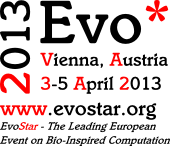![]()
Opening Talk: Wednesday, 3 April at 09:45 am
“Let's get physical: the future of evolutionary computing”
Evolution is one of the major powers in the universe that has been studied for about two centuries. Computers, invented in the 20th century, made it possible to move from passively understanding to actively using evolutionary processes as tools in digital spaces. The related area is called Evolutionary Computing. I argue that in the 21st century (probably in the near future) it will be possible to implement and utilize artificial evolutionary processes outside such imaginary spaces and make them physically embodied. In other words, I envision the “Evolution of Things'', rather than just the evolution of digital objects, leading to a new field of Embodied Artificial Evolution. In this talk I will present this vision in more detail and explain why these developments will radically change our lives.
 Gusz
Eiben is Professor and Head of the Computational Intelligence Group
in the Department of Computer Science at the Vrije Universiteit Amsterdam.
He is one of the European early birds of Evolutionary Computing, with
his first paper on the subject dating back to 1989. Since then he has
published over 100 research papers, and co-authored the first comprehensive
introductory book on evolutionary computing, entitled Introduction to
Evolutionary Computing (Springer, 2003, with J.E. Smith). Gusz's research
interests in evolutionary computing range from fundamental issues such
as reproduction operators, self-calibrating algorithms, and constraint
handling, to applications in data mining, evolutionary art, the simulation
of emergent artificial societies, evolutionary robotics, and more recently,
embodied artificial evolution.
Gusz
Eiben is Professor and Head of the Computational Intelligence Group
in the Department of Computer Science at the Vrije Universiteit Amsterdam.
He is one of the European early birds of Evolutionary Computing, with
his first paper on the subject dating back to 1989. Since then he has
published over 100 research papers, and co-authored the first comprehensive
introductory book on evolutionary computing, entitled Introduction to
Evolutionary Computing (Springer, 2003, with J.E. Smith). Gusz's research
interests in evolutionary computing range from fundamental issues such
as reproduction operators, self-calibrating algorithms, and constraint
handling, to applications in data mining, evolutionary art, the simulation
of emergent artificial societies, evolutionary robotics, and more recently,
embodied artificial evolution.
Gusz has been an organizing committee member for virtually all the major
international conferences on evolutionary computing (CEC, EP, EuroGP,
FOGA, GECCO, PPSN), and is on the editorial board of five international
journals (including JEC, IEEE TEC, GPEH). He is also a series editor
for Springer's book series on Natural Computing, and a member of numerous
science management bodies, including the IEEE Computer Society Technical
Committee on Computational Intelligence, the Executive Board of the
European Network of Excellence on Evolutionary
Computing, and the Steering Committee for the Parallel Problem
Solving from Nature (PPSN) conference series. He presented a TED talk
Tech Kangaroos: Evolution at Work" in 2011.
Dr Richard Watson
Closing Talk: Friday, 5 April at 11:30 am
“EvoConnectionism: The Algorithmic Capabilities of Adaptive Interactions Within and Between Evolving Entities”
This talk discusses a developing body of work characterising a functional
equivalence between learning and evolution. This is based on the observation
that the selective pressures acting on biotic relationships in evolving
systems change fitness interactions in the same way as simple associative
learning rules that are well-understood in the context of neural networks.
This enables conceptual and specific mechanistic knowledge from cognitively-inspired
machine learning research to be applied to surprisingly diverse fields
of evolutionary biology, including: evo-devo, evo-eco, social evolution
and the major transitions in evolution. Here we describe how some of
the recent results derived from this equivalence fit together to form
the basis of a unified theory of ‘evo-connectionism’. In particular,
we discuss the potential of individual selection to facilitate the formation
of higher-level units of selection during an evolutionary transition
via the same principles by which unsupervised associative learning can
beneficially prime performance at supervised learning tasks.
 Richard A. Watson is a senior lecturer in the natural systems research
group at the University of Southampton's School of Electronics and Computer
Science. He received his BA in AI from the University of Sussex in 1990
and then worked in industry for about five years. Returning to academia,
he chose Sussex again for an MSc in knowledge-based systems, where he
was introduced to evolutionary modeling. His PhD in computer science
at Brandeis University (2002) resulted in 22 publications and a dissertation
addressing the algorithmic concepts underlying the major transitions
in evolution. A postdoctoral position at Harvard University's Department
of Organismic and Evolutionary Biology provided training to complement
his computer science background. He now has over 50 journal and conference
publications on topics spanning artificial life, robotics, evolutionary
computation, population genetics, neural networks and computational
biology. At Southampton, he's building his research programme and leading
preparation of a new MSc in complexity science. He is the author of
Compositional Evolution: The Impact of Sex, Symbiosis, and Modularity
on the Gradualist Framework of Evolution (MIT Press, 2006).
Richard A. Watson is a senior lecturer in the natural systems research
group at the University of Southampton's School of Electronics and Computer
Science. He received his BA in AI from the University of Sussex in 1990
and then worked in industry for about five years. Returning to academia,
he chose Sussex again for an MSc in knowledge-based systems, where he
was introduced to evolutionary modeling. His PhD in computer science
at Brandeis University (2002) resulted in 22 publications and a dissertation
addressing the algorithmic concepts underlying the major transitions
in evolution. A postdoctoral position at Harvard University's Department
of Organismic and Evolutionary Biology provided training to complement
his computer science background. He now has over 50 journal and conference
publications on topics spanning artificial life, robotics, evolutionary
computation, population genetics, neural networks and computational
biology. At Southampton, he's building his research programme and leading
preparation of a new MSc in complexity science. He is the author of
Compositional Evolution: The Impact of Sex, Symbiosis, and Modularity
on the Gradualist Framework of Evolution (MIT Press, 2006).







